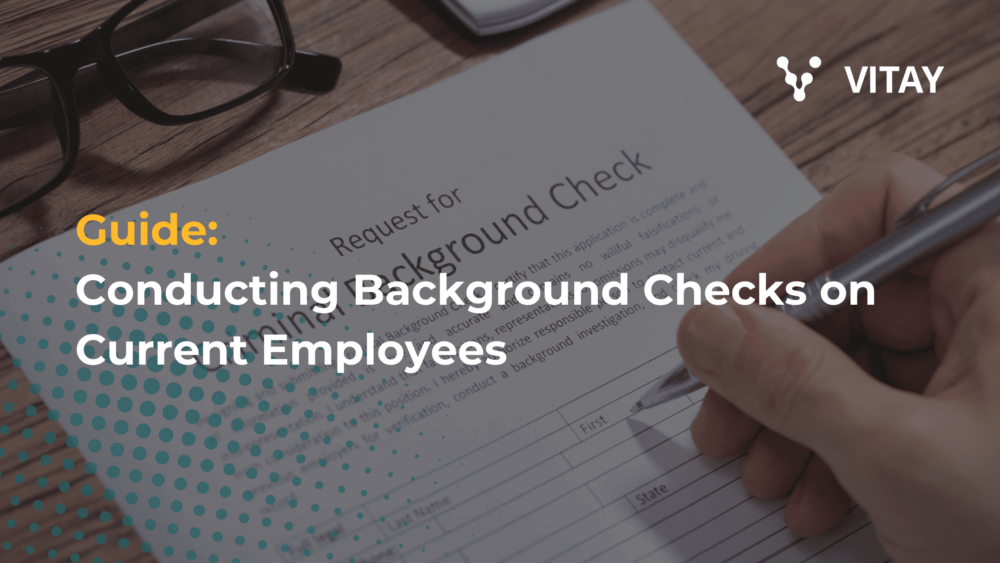In today’s dynamic workplace environment, hiring the wrong employees can backfire big-time. That’s why it’s estimated that almost 95% of US-based businesses conduct a background check before hiring. Most HR pros consider that a standard part of the process.
However, few business leaders think about conducting background checks on current employees. What if a staff member’s recent behavior or job performance raises concerns? A new background check can help you put the puzzle pieces into place.
Conducting background checks on current employees is an innovative practice that fosters a stronger, more reliable team. Uber recently announced its plans to perform annual background checks for its drivers to improve safety. These checks are not merely a procedural formality; they serve as a proactive measure to identify and address potential risks that could jeopardize the safety of your workplace.
Organizations can foster a secure environment for staff and clients by ensuring employees meet specific standards. However, this may require navigating a complex landscape of laws, rules, and regulations—some of which vary by state.
This article offers a guide to conducting background checks on current employees and actionable advice you can apply to your company.
Types of Background Screening
Scenarios are constantly evolving, and real-time insight into your employees offers a lot of value. A significant risk mitigation strategy is looking for and identifying changes in an employee’s data over time. Here are some of the most common types of background checks that can apply to your staff members:
Criminal Background Checks
Criminal background checks are essential for uncovering any past criminal activities that could affect workplace safety, but they can also reveal issues since an employee’s hire date. Employers may find it necessary to conduct these checks when hiring for positions that involve trust, security, or vulnerable populations. Regular checks can help identify any new criminal records that may have arisen since the employee was first hired.
Employment and Education Verification
Re-verifying an employee’s employment history or educational credentials can be crucial, especially in industries where qualifications significantly impact job performance. Situations warranting this include promotions, transfers to new roles, or concerns about employee qualifications.
Credit History Checks
Credit checks are particularly relevant for roles that involve financial responsibilities, such as those in finance, accounting, or management. Such checks can help assess an employee’s reliability and integrity in handling company funds. However, employers must be aware of compliance considerations, such as adhering to the Fair Credit Reporting Act (FCRA) in the United States.
Driver’s License/Motor Vehicle Report (MVR)
MVR checks are vital for employees who operate company vehicles. These checks help ensure that employees have valid driver’s licenses and a safe driving record, reducing the risk of accidents and liabilities for the company. A lot can change in a few years, and finding out about a driving incident that has happened since hire can change the employee’s eligibility.
Drug Testing
Ongoing drug testing may be warranted in roles that require high levels of safety and focus, such as operating heavy machinery or handling sensitive information. Employers should be familiar with legal drug testing guidelines to ensure compliance with state and federal regulations.
Other Screening Types
Depending on the nature of the job and industry requirements, other types of background checks may include social media screenings, reference checks, or professional license verifications.
When to Initiate Background Checks for Current Employees
Why would you need to do so again if you completed a comprehensive background check when an employee started? A lot can change in just a year or two, and most employees have been with their company much longer (while tenure varies a lot by industry, the median is almost 4 years). Consider conducting background checks on current employees if there is any of the following:
Belief in Criminal Activity or Arrest
Employers may find it necessary to conduct background checks if there are suspicions or verified reports of criminal activity involving an employee. This proactive step can help mitigate risks associated with potentially hazardous behaviors.
Security Threats
In instances where there’s a reasonable suspicion of a security threat—such as aggressive behavior or harassment—background checks can help clarify the situation and protect other employees.
Harm to the Business
Background checks can prevent significant harm to an organization, especially in cases of theft, violence, or misconduct. By identifying red flags, employers can take appropriate action to safeguard their operations and make sure they have trustworthy teams in place.
Insurance-Related Requirements
Insurance carriers may mandate regular background checks, such as annual MVR checks for employees who operate company vehicles, to mitigate risks and reduce liability. Depending on your industry, there may be other insurance companies who request regular background checks.
Changes in Job Performance
If you see a big change in employee outcomes, you may want to take a look at what might be going on. Concerns regarding job performance, such as significant declines in productivity or behavioral issues, are a good reason to trigger background checks. Investigating these matters can help identify underlying issues that need to be addressed.
Addressing Employee Concerns and Resistance
Ideally, you’ve asked for written consent allowing background checks when an employee starts. That consent may or may not be valid for ongoing checks in your state, so it’s important to double-check. That being said, just because you legally can conduct the background check doesn’t mean your employees will be happy about it. These tips can help you with employees who may push back on background checks.
Caveats of Completing Background Checks
While background checks are essential for workplace safety, they can raise employee concerns about privacy and trust. Employers must handle sensitive information with utmost care, ensuring confidentiality and conducting checks that are fair and non-intrusive. Consider:
- Double-checking for consent. Again, just because they signed a form when they came on board doesn’t mean that consent holds up years later.
- Transparency around ongoing background checks. If you think this is something you may end up doing, let employees know ahead of time.
- Protection against discrimination throughout the process. No matter how you get the information that makes you consider a current background check, you must comply with federal laws that protect applicants and employees from discrimination.
- A clear policy for termination. What will happen if something unfavorable comes up in the background check? You should have instances that can lead to termination documented and available.
Overcoming Resistance
To address employee pushback, clear communication is vital. Employers should explain the reasons for background checks, emphasizing compliance and safety needs. Providing transparency can help alleviate fears and foster a culture of trust.
Some ways to foster that trust are:
- Clearly communicate the reason for the background check policy, including why the particular employee will have a check conducted.
- Ensure that business leaders understand compliance and safety needs so that they can spot red flags and explain them to employees.
Legal and Compliance Considerations
It’s important to remember that all of these background checks must still comply with the federal Fair Credit Reporting Act (FCRA). This is especially true if an employee may be fired due to what was uncovered in the background check.
Consent Requirements
Obtaining consent before conducting background checks on current employees is crucial. Transparency about the process helps to build trust and ensures compliance with legal standards, and everyone will be on the same page about what’s happening.
Compliance with Local Laws
Employers must be aware of local laws regarding background checks to ensure compliance. It is advisable to consult legal counsel to avoid potential pitfalls and ensure that all procedures adhere to applicable regulations. Remember, the regulations that apply to your specific business will vary from one company to another, so check with local counsel who is well-versed in your regional business landscape.
Discrimination Risks
Background checks must be conducted in a non-discriminatory manner, and one of the biggest mistakes you could make is conducting background checks based on biases. The checks should be relevant to the job in question and applied consistently across the workforce to prevent potential discrimination claims. Again, if you have questions here, you should consult with a legal expert.
Using Third-Party Services
In today’s technology era, there are some ways to make your job easier. Third-party tools like Vitay can shorten and streamline your entire background check process – all while helping to support compliance and employee comfort.
Benefits of Professional Services
Employing third-party providers such as Vitay for background checks offers significant advantages. Specifically, using a third-party tool for background screenings will result in:
- Accurate and compliant screenings
- Reduced risk of mishandling personal data
- Enhancing adherence to state and federal legal requirements
- A quicker background check process with employees (or candidates)
- A single source for both reference checks and pre-screening during hiring
Policy for Outcomes and Termination
Developing a clear policy for handling outcomes from background checks is essential. Employers must handle “failed” screenings with respect and consistency, including having a termination policy in place for serious concerns. In these cases:
- Start by consulting whatever formal policies you have in place. Ideally there are guidelines in place for what is acceptable and what is a fireable offense.
- If termination is necessary, consider consulting a legal professional to help you create the proper paperwork. You may also ask about how the termination should be done (for example: with a witness, in person, etc.)
- If the background check concerns you – but doesn’t contain a fireable offense – then you may want to inform the employee. In hiring, this is called a pre-adverse action notice. Essentially, it means you should be transparent about what the background check discovered and what you may need to do about it.
- Allow the employee time to respond. Sometimes (rarely), there has been a mistake, or there is a logical reason why something appeared in the screening. If you have previously trusted this employee, you may want to see if they can explain. However, good judgment must be applied here. There is a difference between finding some new consumer debt on a credit check vs. a physical assault charge in the legal system.
- Ensure final paperwork is in order and follow the procedures of your HR leader or legal counsel. You must ensure the employee was properly communicated with throughout the process and that you have collected any necessary documentation.
Furthermore, there are also regulations set forth by another organization. The policies of the Equal Employment Opportunity Commission (EEOC) govern which information can be reported and how it can be used by employers. These policies typically revolve around hiring; in particular using what is found in a background check in the decision to extend an offer to a candidate or not. These regulations require employers to consider factors surrounding a previous conviction. For example, how old they were and how long ago the incident occurred. In your state, you may also need to understand these regulations for new hires as well as current employees.
Most business leaders want to offer safe and compliant workplaces for all of their employees. This not only cultivates a trustworthy workplace, but also adds to productivity and profitability. Conducting background checks on current employees is sometimes an afterthought – but it’s a process that can play a vital role in addressing risks.
By proactively identifying and addressing potential problems, organizations can protect their employees and their business interests. Employers are encouraged to seek professional advice when implementing background check policies to ensure both legal compliance and positive employee relations. For more insights on simplified background checks, learn about Vitay and our powerful platform for all-in-one screening.




Comments are closed.